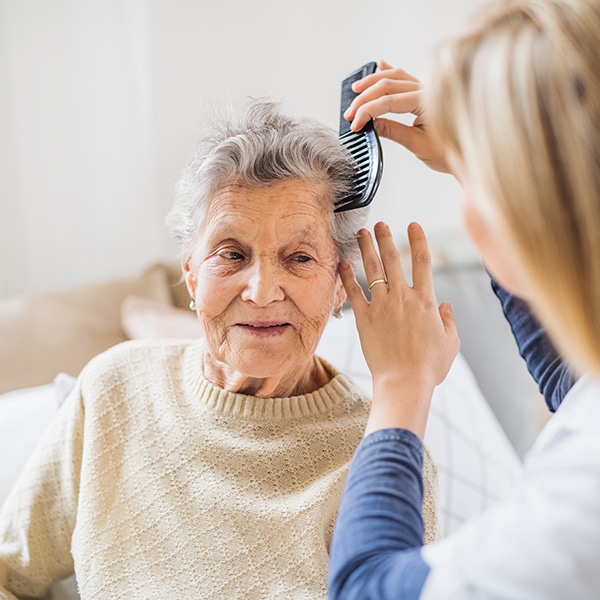Aaron Home Care was born from a passion to make a difference in the lives of seniors. Our top priority is providing the best non-medical home care. Whether you’ve just begun thinking about home care solutions or you’re ready to schedule a consultation, we’re here and ready to help.
As a California-licensed, bonded and insured Home Care Agency, all our caregivers are trained and registered as Home Care Aides. The Aaron Home Care team is dedicated to serving clients, 24/7/365. Rest assured knowing that our clients and the caregivers that are attending them are fully supported round-the-clock.
When your family member is dealing with a serious illness, you may feel at a loss as to how to help at all. The worst can be watching your family member struggle with symptoms that her curative therapies may not be able to help manage. That’s why palliative care can be an excellent option.
The most important thing to understand about palliative care is that it’s about ensuring your senior has the relief that they need. This type of care helps to offer relief from side effects and from pain, discomfort, and other symptoms that can be difficult to manage. Your elderly family member has the help that they need to address the issues that are most pressing for her.
This type of care is offered primarily to people who have a life-threatening chronic illness. Illnesses such as cancer, COPD, liver disease, and kidney failure are all progressive conditions that take a huge toll on your family member. The bottom line is that if your family member is dealing with a serious illness and is experiencing a great many symptoms as a result, talk with their doctor about palliative care options.
Because both types of care involve assisting someone who is dealing with serious illness, palliative and hospice care are often mistaken for each other. Hospice is for patients who are near the end of their lives, usually with six months or less remaining according to their doctors. Palliative options can start soon after your family member is diagnosed with a qualifying condition.
There’s not just one professional helping your family member once they decide that palliative treatments are right for them. They have access to a variety of different professionals who can work to help them meet their needs.
Non-medical home care by Aaron Home Care, physical therapy, occupational therapy, social workers, nutritionists, and so many other types of professionals work with your family member’s medical team to provide them with the best care possible.
It’s difficult for family members to know how to cope with serious illnesses, as well. Palliative care also offers a way for family members to get the help that they need. It’s also much easier to find the information that you need in order to keep helping your family member when you have a wealth of resources you can tap into on a regular basis. The end goal is making sure that your family member has what they need in order to have the best quality of life possible.
It is our mission to allow seniors to live at home safely and comfortably by providing the skilled and compassionate caregivers they need.

Palliative care addresses many issues. These are some of the top areas palliative care helps people with.
Physical
In addition to helping people manage symptoms of their illness, palliative care can also help people experiencing severe side effects from their treatment. Types of physical symptoms palliative care may address include pain, loss of appetite, vomiting, nausea, fatigue, shortness of breath, and insomnia.
Spiritual
Some people find being diagnosed with a severe, potentially life-threatening disease brings them closer to their religion, while others may start questioning their faith.
Emotional and Coping
Anxiety, depression, fear, and other emotions often accompany a new diagnosis. Palliative care experts can help connect patients and their families to resources that can help them cope with these emotions.
Practical Needs
Palliative care specialists can help with practical needs like insurance questions, legal or financial concerns, employment worries, and discussing care goals.
Caregiver Needs
Family members caring for a person with a severe illness also have needs that palliative care can assist with, such as respite care and emotional support.

Of course, there are other questions you should be asking, but by asking the 3 critical questions first, you will have already covered a lot of ground as far as protecting yourself or your loved one.
Here are other questions to ask home care agencies when you interview them:
Learn how Aaron Home Care can serve you. As a California-licensed, bonded and insured Home Care Agency, all our caregivers are trained and registered as Home Care Aides. The Aaron Home Care staff is dedicated to serving clients, 24/7/365. Rest assured knowing that our clients and the caregivers that are attending them are fully supported round-the-clock.
Additionally, we won’t lock you into a contract, and your schedule can change as your needs change. We offer a flat, hourly-fee for all caregiving services—we don’t “nickel and dime”.
Give us a call 619-880-5522 if you have other questions. We’ve got answers!
When interviewing an agency that provides in-home caregivers, find the answers to these 3 critical questions first.
All home care organizations state-wide must be approved by the California Home Care Registry. A Home Care Organization (HCO) license ensures the following requirements are met:
Why It Matters to YOU:
Home Care Licensure was set up by the state to protect the consumer, and is a requirement of all California Home Care Organizations (HCO)! No agency should be operating without a valid HCO license.
Furthermore, families who hire private caregivers or choose “referral” agencies unknowingly become “employers,” subject to the all the risk and liabilities that professional insurance protects against, like theft, on-the-job injury, etc.). Without the types of insurance required by state licensure, and without knowing labor law, families could be putting themselves at risk for costly lawsuits, fees, and fines. By choosing a state licensed home care agency, you know you are protected.
Any working California caregiver, whether hired privately or through an agency, must be registered as a Home Care Aide (HCA) through the state. All registered HCAs are required to:
Why It Matters to YOU:
Feel safer knowing that any registered home care aide working in your home will have cleared an extensive government background check, will be free of tuberculosis, and will be adequately and continually trained to perform basic caregiving tasks. This is the bare minimum to be compliant with California regulations. Every individual agency may require more of their caregivers.
Not all agencies keep the same office hours. Some agencies let voice mail pick up calls after office hours and on weekends. Other agencies forward their phones to an answering service who will relay the messages on. The best agencies will have dedicated care managers on call 24 hours a day ready to help you, right then and there. Find out how accessible agency care managers are.
Why It Matters to YOU:
Things come up, at all hours of the day and night. When something happens after hours, you or the caregivers in your home will need to talk to someone who can make decisions and take action. Basically, you need an agency who is truly there for you at all times.